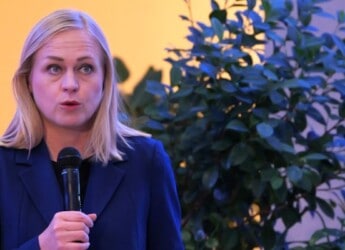Editor’s Note: The article “Media Evolution: Striking a Balance in the Age of Generative AI” delves into the transformative journey of news organizations as they navigate the burgeoning potentials and ethical considerations brought forth by AI technologies. Highlighting the groundbreaking initiatives of leading entities such as Le Monde and their collaborative ventures with AI pioneers like OpenAI, this article explores the industry’s cautious yet optimistic strides toward integrating AI into journalism. With a focus on enhancing journalistic integrity, embracing innovation, and maintaining the invaluable human touch in storytelling, the piece sheds light on the efforts to establish a balanced symbiosis between AI advancements and traditional journalistic values. It is a compelling read for professionals in cybersecurity, information governance, and eDiscovery, offering insightful perspectives on the evolving landscape of media, the proactive measures being taken to uphold ethical standards, and the ongoing commitment to a human-centric approach in the age of AI.
Content Assessment: Media Evolution: Striking a Balance in the Age of Generative AI
Information - 93%
Insight - 94%
Relevance - 92%
Objectivity - 91%
Authority - 92%
92%
Excellent
A short percentage-based assessment of the qualitative benefit expressed as a percentage of positive reception of the recent article on generative AI in journalism by ComplexDiscovery OÜ and titled, "Media Evolution: Striking a Balance in the Age of Generative AI."
Industry News – Artificial Intelligence Beat
Media Evolution: Striking a Balance in the Age of Generative AI
ComplexDiscovery Staff
The rapid evolution of generative artificial intelligence (AI) is prompting news organizations to rethink their approach to content creation. With entities like OpenAI and products like ChatGPT shaping the discourse, the media landscape is tentatively embracing AI’s potential. Moreover, the collaboration between major media houses like Le Monde and technology giants underscores a shared goal: to harness AI responsibly and enhance journalism.
Le Monde has led the way, adopting a charter for AI use in its newsroom on December 15, 2023. The charter, backed by the Normal Meeting of the Societ Editrice du Monde, asserts AI will not replace human journalists but serve as a tool to bolster the quality of content. Such proactive steps, involving entities like La Vie and Tlerama, indicate an industry seeking a balance between AI opportunities and the irreplaceable value of human intelligence.
Felix Simon’s reflections on the implications of AI in newsrooms resonate with the cautious optimism prevalent in media circles. As Simon’s research indicates, the integration of AI varies across newsrooms, with larger entities like Le Monde capitalizing on AI to enhance translations via products like DeepL and to provide services like audio articles. While leveraging entities such as Polytechnique Insights for expert insights, these innovations seek to maintain a connection with human journalism’s core values.
The foresight of European entities in regulating AI, with the European Parliament setting precedence, is indicative of a larger trend toward ensuring a responsible AI ecosystem. Similarly, OpenAI’s partnerships with media companies across different geographies, from France’s leading newspaper, Le Monde, to Prisa Media, which extends its reach to the Spanish-speaking regions of Latin America, mirror an industry adapting to change while upholding journalistic integrity.
The ethical quandaries posed by AI, including the handling of personal data in accordance with laws like the Patriot Act, are being navigated with transparency, as emphasized by journalism professionals like Emilse Garzon. Garzon notes the importance of disclosing AI-generated content to audiences, further underscoring the commitment to ethical journalism.
In the broader context, the global responses to AI from varying perspectives within the Global South to American tech firms elucidate the diverse impact of such technologies. The discourse surrounding AI in journalism remains diverse, from the recognition of its capabilities to enhance stories, as highlighted by Carlos Nunez, CEO of Prisa Media, to concerns over AI potentially replacing certain job roles.
Generative AI’s transformative potential is being met with pragmatic strategies, ensuring its role as an assistant rather than a substitute for human creativity. As journalism ventures into this new frontier, the commitment to a human-centric approach, as seen through entities like Channel 1 AI and Le Monde’s implementation of AI, persists as the guiding principle for an industry at the cusp of innovation.
Despite the advancing technological partnerships, challenges such as combatting fake news and protecting copyrighted materials, as seen in The New York Times lawsuit against OpenAI, persist. Yet, newsrooms are striving to integrate AI innovations like ChatGPT-4 and Midjourney with a primary focus on upholding journalistic standards and enriching the reader experience. As this trend unfolds, it is evident that the role of AI in journalism is to augment, not diminish, the human element that remains central to storytelling.
News Sources
- Le Monde adopts a structure on artificial intelligence
- Embracing AI: How to stay ahead of the curve | International Journalists’ Network
- Reliability, regulation… 4 things you should know about the limits of generative AI
- AI in newsrooms: revolution or retooling?
- OpenAI swoops up French and Spanish news partners for AI chatbot training
Assisted by GAI and LLM Technologies
Additional Reading
- Generative AI and the First Amendment: Legal Experts Weigh in on the Need for Regulation as Election Nears
- Prompt Engineering: The New Vanguard of Legal Tech
Source: ComplexDiscovery OÜ



























